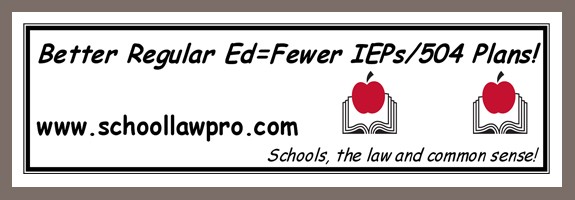It’s April and time for STEP Four! As you know, every month in 2011, we’ll post a STEP to FIX special education. There are 12 steps. By December, our systemic transformation should be well underway! Please share your comments and let us know the steps you are taking to fix special education.
April 2011—Step Four to change the path we are on
Educate all students, without labels. End the reliance on the medical model as gatekeeper for services in our schools.
Where we are now….
To obtain special education services in the U.S., a student needs to pass a gatekeeper to get a label signifying that he or she is diagnosed with one or more of the 14 disability categories recognized by federal law. The term ‘medical model,’ as used here, describes that gatekeeper model—a system to diagnose children and then special education to ‘fix’ or ‘treat’ or remediate the disability. The law is based on the idea that something is wrong with the child that the schools need to fix or improve.
Many issues have emerged from this label-driven system. Much of it is based on flawed research. For example, the labels we used are viewed as fixed—even as brain research suggests otherwise—the brains are more fluid and change over time. We spend much effort on treating the disability, rather than focusing on skills and knowledge that students need to learn. Some science we believe in—such as the belief in ‘learning styles,’ or dividing students into VAK categories (visual, auditory, kinesthetic)— is discredited by current science. And finally, we really don’t know why some struggling learners are labeled with a disability and receive special education services, while others are left behind as, well, just ‘struggling learners’ Our identification procedures are flawed.
Where we need to be. How to fix it? We need to change our belief systems and the incentives we have in place. We need to make it unproductive to spend money and time on labeling, and productive to spend it on teaching and learning. As Don Asbridge wrote, “Students need to go to school to get an education, not a diagnosis.”
We need to focus on educating all children—not on sorting them. Let us educate children based on what they know and can do and need to learn, rather than on who they are.
The No Child Left Behind Act and IDEA’s focus on response to intervention (RtI) is a good start. RtI provides targeted assistance to young students, especially in reading and math. The theory is that if we teach children at their level—from the start—fewer of them will be referred for special education.
Every learning difference is not an illness or defect. Teachers need to focus on teaching all types of learners, not sorting and diagnosing them.
Creative open-minded problem solvers—we need you now!
____________________________________
These steps are taken from Fixing Special Education—12 Steps to Transform a Broken System. The book is available at School Law Pro: http://schoollawpro.com/fixing-order.doc and at
Park Place Publications at http://www.parkplacepubs.com/online-store/view/fixing-special-education-12-steps-to-transform-a-broken-system
Stay tuned for May’s STEP!
![GOOD DEED[1]](http://schoollawpro.com/wp-content/uploads/2011/04/GOOD-DEED1.jpg)
![Not in writing[1]](http://schoollawpro.com/wp-content/uploads/2011/04/Not-in-writing1.jpg)
![Experts R Us[1]](http://schoollawpro.com/wp-content/uploads/2011/04/Experts-R-Us1.jpg)

![Relationship[1]](http://schoollawpro.com/wp-content/uploads/2011/04/Relationship1.jpg)
Recent Comments